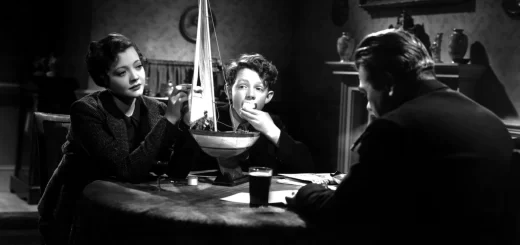An Aching Pain, by Scott Nye
Joel and Ethan Coen have been fascinated with themes of fate, inevitability, recursiveness, hubris, and circularity throughout their career, sometimes turning off viewers with a sort of anti-humanist Rube Goldberg machine like A Serious Man (for which Ethan boasted that he and Joel would sit around during the writing process, just dreaming of further ways to torture their beleaguered protagonist). This critic found that film to be among the best of their often difficult-to-rank catalogue; those hungry for a little warmth out there in all that darkness may not find complete relief in their latest film, Inside Llewyn Davis, but I daresay it may be their most compassionate film to date.
Llewyn Davis (Oscar Isaac) is a folk singer in 1961 New York, drifting from couch to couch and gig to gig as he struggles to eke out an honest living, though his definition of that familiar phrase differs a good deal from that of many others. Llewyn, once part of a stable, if not wildly successful, duo, does not seem particularly passionate about his chosen field, just how he chooses to go about it – no selling out, no more partners, and, perhaps most tellingly, no original material. The Coens and their music supervisor, T. Bone Burnett, used existing songs for fictional characters, but it’s more than a simple matter of convenience. The first scene shows Llewyn performing “Hang Me” at a small cafe, remarking afterward that the audience had probably heard it, and that if it ain’t new and was never old, then it’s folk music. His great claim on honest independence is regurgitating the work of others for nostalgia-friendly crowds. It’s not that he is missing out on the opportunities that would soon be afforded Bob Dylan in those very circles; he is simply not an agent of change, nor even of originality.
He relies on the past in more ways than just the performative aspects of his life – his most stable couch, the apartment in which he is most comfortable, belongs to longtime friends Jim (Justin Timberlake) and Jean (Carey Mulligan), the latter of whom is permanently enraged at him for the way in which he continually takes advantage of him. There is also the matter of her recent pregnancy. And so you can see how things begin to pile upon Llewyn; some are the mere whims of fate, but most difficulties can be traced back to his obstinacy and narcissism. “It’s nice to be important, but it’s more important to be nice,” they say, and Llewyn could very well find that one leads to another, were he so willing. He’s hardly a monster, but is too consumed with his own despair to see any way out.
I suppose this may make him terribly “unlikable” for certain viewers, but, you know, there’s no saving some people. Llewyn is human. The Coens and Isaac magnificently render him in all his humanity, all his sadness and anger and longing, stripping away all of the romance that is often attached to the period and leaving only the desperation. As Llewyn wiles away the day in a Chicago coffee shop, waiting to confront a manager he does not know in a town he does not live, he removes his soaking foot from his snow-covered shoe, hoping to find brief respite before the wait staff has to turn over the counter and he’s on his way to get kicked out of a train station. He has a set of clothes and a guitar. A cat has recently fallen into his care. That’s it. There’s little that’s wonderful about such an existence; occasionally it is beautiful, but only from a distance. Sometimes, the Coens keeps theirs, but mostly, they force us to sit in such a state, and, like Llewyn, make of it what we will.
Without Isaac, however, they would have nothing. His rendering of Llewyn isn’t real; it’s realer than real. He works in complete harmony with the Coens, using a glance or expression that the Coens illuminate into tremendous meaning (a look towards a road sign directing toward Akron has never been more emotional). He plays the character’s spite with tremendous sadness, the posturing of a man living for nothing and turning against everything. He’s almost going through the motions as he stakes yet another claim on his artistic temperament and pride, disparaging a dinner host who asks him to play some music by insisting that music is his job, how he “pays the rent,” even though we’ve seen just how thoroughly he isn’t paying the rent at all. “I thought music was a joyous expression of the soul,” he host insists, but that’s not music for Llewyn. Maybe once. But like an addict, it’s withered, and now, at best, it can bring him a moment’s peace when anything else is completely unbearable.
The film might not function as a musical in the great tradition with which it’s most readily identified, and yet the musical performances within the film serve the same function – to magnify the soul of its performer. Llewyn is rarely in a position in which he is compelled to play a particular song, so those he chooses to perform at various moments are telling to his state of mind (luckily, it should be noted, Isaac is a damn good singer himself), as does the manner in which he performs them. He might be pouring everything of himself into it as he makes one last grasp at the big time, or recognizing his own mortality as he looks upon his distant father. The film’s most joyous number (and its only original, but only technically so), “Please Mr. Kennedy,” is so clearly inauthentically engineered to be a pop single that Llewyn can’t help but ask Jim, who got him the recording gig, who was responsible for its creation. When it turns out it was none other than Jim himself, Llewyn’s hesitance and cynicism disappears into regret and embarrassment, which then turns to abandonment as he happily plays his part alongside his destined-to-be-much-more-successful cohort, happy just to get $200 for what will almost certainly become a much more valuable service.
It almost goes without saying, at this point, that all the hallmarks of the Coens’ familiar craft remain present, from their rounded cast of sharply-written supporting players (Max Casella’s bar owner and John Goodman’s aging jazz musician contribute many of the film’s plentiful laughs, while Carey Mulligan’s multi-dimensional portrait of exploding frustration really left a mark) to the absolute gorgeous, sharply-framed cinematography. The Coens’ regular cinematographer, Roger Deakins, was too busy shooting Skyfall to work with them this time around, but the very capable Bruno Delbonnel stepped up here with a very stark portrait of New York winter that is as unsparing as the spiritual universe in which Llewyn lives. More so than perhaps ever before, the Coens have crafted an environment that feels at once entirely true and entirely a reflection of their protagonist. The set direction isn’t as exaggerated as in Barton Fink (though they do a couple New York apartment hallways that are great visual jokes), but it operates similarly. Sometimes it’s clever misdirection – when he wakes up in a posh Upper West Side establishment, we think perhaps he has it pretty good after all, until it turns out that it’s yet another couch to crash on, miles from any place he could hope to call home – other times, the absolute brutal truth, as the opening and closing scenes brilliantly illustrate.
And all the while, Llewyn keeps hustling. Hustling for a gig, for a place to sleep, for a cigarette; for a bit of friendship, even if he won’t admit it. It’s often said that cynicism is born from defeated romanticism, and Llewyn is the perfect illustration of that, a guy with a lot of principles but no ideals left to spare. They were there, once, we can easily surmise. He moves about social circles too well to have been consumed with this sort of attitude his entire life. And he does genuinely care – he’s broken up over insulting one friend, losing another’s cat, missing out on a couple of romances, a chance at a life worth living. It’s one of the year’s great melodramas, not in the way that word is thrown around these days, indicating a lot of histrionics and screaming, but in the traditional meaning; of musical drama, of heartache, or missed opportunities and the absolute misery of being trapped within oneself. It is one of the year’s finest films, and I love it totally.






























Finally got to see this yesterday, and I can’t wait to see it again (maybe even later tonight). It was easily my most anticipated film of the year, and it wound up being my favorite, so it was fitting that I saw it on New Year’s Eve. I went in not long after hearing the most recent BP episode, where Tyler and David brought up the notion that the film is at least partly about the grieving process. I must say that rang very true to me, and I’m glad I went in with that in my head. It might not have occurred to me otherwise, and I think it gave me a richer experience with the film.
My gut reaction, and this might be slightly controversial, is that it’s not only my favorite film of 2013, but my favorite film by the Coens. Of course it’s still fresh in my head, so it may be too early to tell, but it struck a deeply personal chord with me. That’s something that none of their previous films, no matter how great they are or how much I love them, have ever done. Part of it is because I’m a musician with a strong folk influence, but a bigger part is that I feel like someone who destroys whatever he touches, someone who perpetually carries a burden he didn’t ask for, someone who paradoxically hates the thing he loves most, someone whose voice is the only worthwhile thing about him.